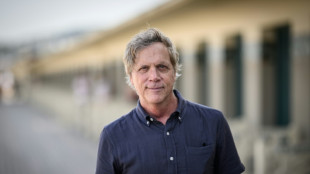
-
 Trump fills out cabinet as divisive picks shock Washington
Trump fills out cabinet as divisive picks shock Washington
-
Son hits 50th South Korea goal in win, Australia-Saudi stalemate

-
 BHP, Vale cleared by Brazil court over 2015 dam disaster
BHP, Vale cleared by Brazil court over 2015 dam disaster
-
Satirical US outlet The Onion buys conspiracy site Infowars

-
 Scotland must emulate Croatia's 'conveyor belt of talent': Clarke
Scotland must emulate Croatia's 'conveyor belt of talent': Clarke
-
Legal migration to OECD reaches new record in 2023

-
 Robinson edges Benazzi to succeed Beaumont as head of World Rugby
Robinson edges Benazzi to succeed Beaumont as head of World Rugby
-
India's capital shuts all primary schools due to smog

-
 Central bank independence 'fundamental' for good policy: Fed official
Central bank independence 'fundamental' for good policy: Fed official
-
Fritz beats De Minaur to eye ATP Finals last four, Sinner through

-
 Doris expecting a 'proper test' against Argentina
Doris expecting a 'proper test' against Argentina
-
Russia's exiled opposition hopes for rebirth with Berlin rally

-
 EU fines Meta $840 million for 'abusive' Facebook ad practices
EU fines Meta $840 million for 'abusive' Facebook ad practices
-
Springboks boss Erasmus expects England to 'play for Borthwick'

-
 Before Leicester, Ranieri's brush with glory with his beloved Roma
Before Leicester, Ranieri's brush with glory with his beloved Roma
-
Stock markets rise as traders weigh future Fed cuts

-
 Australian Robinson edges Benazzi to head World Rugby
Australian Robinson edges Benazzi to head World Rugby
-
US director Haynes to lead Berlinale 2025 jury

-
 Iran tells UN nuclear chief willing to resolve 'ambiguities'
Iran tells UN nuclear chief willing to resolve 'ambiguities'
-
Coach owner Tapestry calls off Capri bid on regulatory blocks

-
 UK government announces ban on new coal mines
UK government announces ban on new coal mines
-
US ski star Lindsey Vonn, 40, to attempt competitive return

-
 Ranieri comes out of retirement to lead hometown club Roma
Ranieri comes out of retirement to lead hometown club Roma
-
England recall Steward and Van Poortvliet for South Africa Test

-
 EU fines Meta 798 mn euros for Facebook ad antitrust breach
EU fines Meta 798 mn euros for Facebook ad antitrust breach
-
Australian Brett Robinson graduates to rugby's top post

-
 Brazil looking for motive after attempted Supreme Court bombing
Brazil looking for motive after attempted Supreme Court bombing
-
Hotels on Booking.com can offer better rates elsewhere: EU

-
 EU deforestation ban in chaos as parliament loosens rules
EU deforestation ban in chaos as parliament loosens rules
-
Springboks make 12 changes to team for England clash

-
 All Blacks fly-half Barrett returns from concussion against France
All Blacks fly-half Barrett returns from concussion against France
-
UEFA launches investigation into Premier League referee Coote

-
 Monaco Formula One GP extended until 2031
Monaco Formula One GP extended until 2031
-
Climate finance: who is being asked to pay what at COP29?

-
 'Terrible' AI has given tech an existential headache: activist
'Terrible' AI has given tech an existential headache: activist
-
COP29 host tries to calm waters after diplomatic turmoil

-
 Late drama as Saudis hold Australia in World Cup qualifier
Late drama as Saudis hold Australia in World Cup qualifier
-
Stock markets diverge as traders weigh future Fed cuts

-
 Israel warfare methods 'consistent with genocide': UN committee
Israel warfare methods 'consistent with genocide': UN committee
-
'In-form leader' Fickou starts for France against New Zealand

-
 Iran activist kills himself after demanding release of prisoners
Iran activist kills himself after demanding release of prisoners
-
Russia shuts Moscow's famed gulag museum

-
 London mayor says Trump attacks due to his ethnicity and religion
London mayor says Trump attacks due to his ethnicity and religion
-
Japan expect tough Indonesia test with World Cup spot in reach

-
 Uganda TikToker convicted for insulting president
Uganda TikToker convicted for insulting president
-
Thousands flee as Typhoon Usagi hits north Philippines

-
 Burberry launches turnaround plan as posts loss
Burberry launches turnaround plan as posts loss
-
Fickou starts for France against New Zealand

-
 Spain flood epicentre survives fresh rain alert
Spain flood epicentre survives fresh rain alert
-
Man with explosives dies in blast at Brazil's Supreme Court

| RBGPF | -1.59% | 59.25 | $ | |
| SCS | -0.19% | 13.344 | $ | |
| BTI | 0.51% | 35.6 | $ | |
| CMSD | 0.1% | 24.755 | $ | |
| NGG | 0.7% | 62.56 | $ | |
| BCC | -1.14% | 140.94 | $ | |
| GSK | 0.32% | 35.221 | $ | |
| RIO | -0.34% | 60.415 | $ | |
| CMSC | 0.06% | 24.625 | $ | |
| RYCEF | -2.16% | 6.96 | $ | |
| RELX | 0.42% | 46.315 | $ | |
| AZN | 0.9% | 65.885 | $ | |
| BCE | 0.42% | 27.325 | $ | |
| JRI | 0.08% | 13.25 | $ | |
| VOD | 0.34% | 8.78 | $ | |
| BP | 1.09% | 28.885 | $ |

Nature at risk of 'cascading' species extinction: study
Climate change and habitat degradation will cause extinctions that cascade through communities of animals and plants and drive dramatic biodiversity loss, according to new research published on Friday.
The study, in the journal Science Advances, found that chain-reaction extinctions are unavoidable and predicted Earth's ecosystems will see average biodiversity loss of between six and 10 percent by 2050, depending on different carbon emissions scenarios.
By 2100, losses of animals and plants could rise to as much as 27 percent, they found in their research that used virtual Earths to map out thousands of food webs.
The authors said their modelling suggested that the biggest changes will come before mid-century, predicting "the bleakest time for natural communities might be imminent and that the next few decades will be decisive for the future of global biodiversity".
With life on Earth under threat from human destruction, overexploitation and pollution, scientists have warned that a million species are facing extinction in what many fear heralds the planet's sixth mass extinction event.
Climate change is expected to dramatically accelerate the losses, with impacts of warming ranging from the effects of extreme weather, to changes in behaviour and habitat.
But authors of the new study said previous modelling has not included estimates for co-extinctions, based on the "cascading effect" of losses on interdependent species.
The researchers in Australia and Europe built hundreds of virtual Earths each populated with more than 33,000 vertebrate species in thousands of food webs across the planet –- "massive computer latticeworks of 'who eats whom'," said co-author Corey Bradshaw, a professor at Flinders University.
They then simulated different climate change scenarios and projections of habitat degradation -- like deforestation -- to predict local biodiversity loss, the proportion of animalslost in a given area.
- 'Life support' -
The virtual worlds allowed researchers to watch as species moved around and adapted to new environmental conditions and the implications of individual extinctions across food webs.
They found that climate change would be responsible for the greatest proportion of extinction events.
"If you look out your window in 87 years, on average you'll see nearly 30 percent fewer animal species than you do today based on the business-as-usual climate scenario," Bradshaw told AFP.
The study found the greatest threat was in places with the greatest biodiversity -- 36 highly-vulnerable areas containing the most unique species.
"This is because the erosion of species-rich food webs makes biological communities more susceptible to future shocks," said Bradshaw, adding it was "a case of the rich losing their riches the fastest."
The research comes as a UN summit in Montreal attempts to seal a historic "peace pact with nature" and end the rampant destruction.
Global efforts to curb global warming have often eclipsed efforts to tackle the devastation being wrought on nature, but experts have increasingly warned that the two crises are inextricably linked.
"In many ways, biodiversity loss from climate change is far more serious than what climate change will do to human societies, because biodiversity is the very fabric of the Earth's life-support system that makes our lives possible," said Bradshaw.
"The imperative of massive and rapid emissions-reduction policies is made much more urgent knowing this."
J.Williams--AMWN



